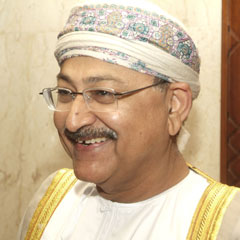Oman Daily Observer | 1 June 2009
By Conrad Prabhu
MUSCAT -- Oman has sought the assistance of the specialised UN agency, UNCTAD, in conducting a study on food security, Commerce and Industry Minister Maqbool bin Ali Sultan said here yesterday, while listing food insecurity and inflation as "new challenges" facing the country. Maqbool bin Ali was speaking at the opening of the 'OER Top 20 Debate' organised by Oman Economic Review in association with the Capital Market Authority (CMA). Corporate bigwigs from some of the largest companies in the Sultanate attended the event.
Delivering the keynote address on the 'Impact of the Global Financial Crisis on the Omani Economy', Maqbool outlined a number of challenges -- old and new -- to the Sultanate's longer-term socio-economic development. The global food price crisis of 2008, he said, had sent many Gulf states scurrying to countries in Africa, Asia and the Far East in search of farmland to grow crops and secure future food supplies. The UNCTAD study, he said, was one of two studies aimed at enhancing food security in the Sultanate.
Inflation, which had surged to unprecedented levels in 2008, is another worrying phenomenon, the Minister said. The Consumer Price Index (CPI) had peaked to a record 12.4 per cent last year, but has since slumped to 4.5 per cent as of April 2009, and is expected to fall further to around 4 per cent during the year, he noted.
"Oman historically has had very low or even negative inflation. Inflation is new to Oman -- a phenomenon not seen in many years," Maqbool stated, adding that the country had not been prepared for the alarming levels to which inflation had reached during 2007-2008. Commenting on the Omani economy's exceptional performance in 2008, he said the Gross Domestic Product (GDP) had climbed to a robust 12 per cent, while oil and non-oil exports had reached record highs.
The trade surplus amounted to a sizeable RO 5.7 billion, with all sectors of the economy performing strongly during the year. In fact, the Sultanate's economy has grown by leaps and bounds over its roughly 40-year modern history, Maqbool said. The GDP has grown 185-fold from $270 million in 1970 to around $50 billion last year. Per capita income has soared 50-fold from $400 in 1970 to $20,000 in 2008.
Citing the findings of a World Bank survey of post World War II economies, Maqbool said the Sultanate was among only 13 'success stories' with economies that had grown 7 per cent every year over the period of the survey (1960-1985). More recently, a study by the Economist Intelligence Unit (EIU) had ranked the Sultanate among only 13 countries of the world with a "low" investment risk.
In his address, Maqbool also outlined the steps taken by the government to mitigate the effects of the global downturn on the Omani economy. Capex allocations in the 2009 budget are 11 per cent higher than in the previous year, despite the fall in revenues on account of lower oil earnings. This is also evident in the government's decision to press ahead with the implementation of a number of "mega-projects", including the Muscat and Salalah airports, six regional airports, roads and highways, power and water projects, dams, petrochemical plants, and port developments at Duqm, Sohar and Salalah.
Further, the RO 150 million Market Stabilisation Fund continues to bolster the stock market, he said, adding that the government is studying various other ways to further boost the local economy. At the same time, he urged the private sector to look at the financial crisis at an opportunity to change mindsets, notably by genuinely encouraging economic diversification and Foreign Direct Investment (FDI), promoting mergers and acquisitions, eschewing consumerism in favour of a savings-oriented culture, and embracing local products over imported goods.
He also appealed for strong private sector support for the cause of human resources development, describing it as a major challenge. He urged private organisations to provide not only employment but also on-the-job training and skill-building opportunities for Omanis. Maqbool's keynote address later paved the way for a vigorous debate on the 'State of Oman's Economy', moderated by Philip Stanton, Managing Partner of Ernst & Young. Earlier, Yahya al Jabri, Executive President of the CMA, also addressed the event.













